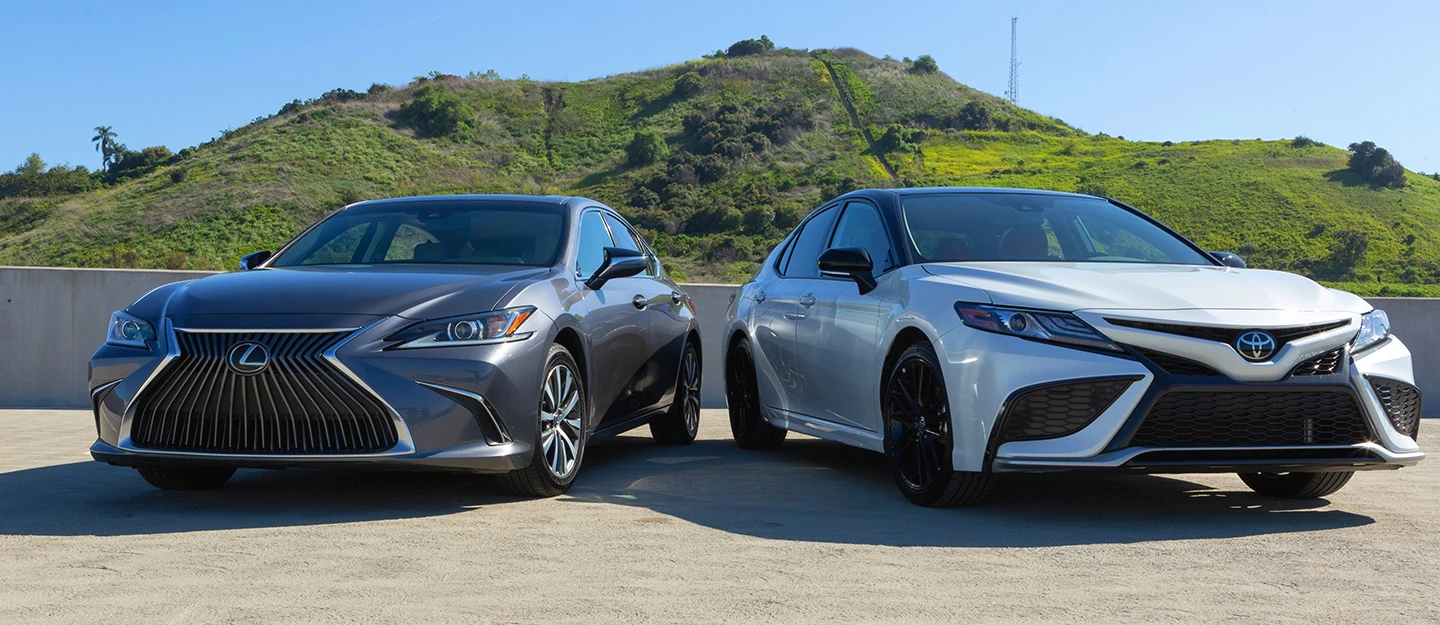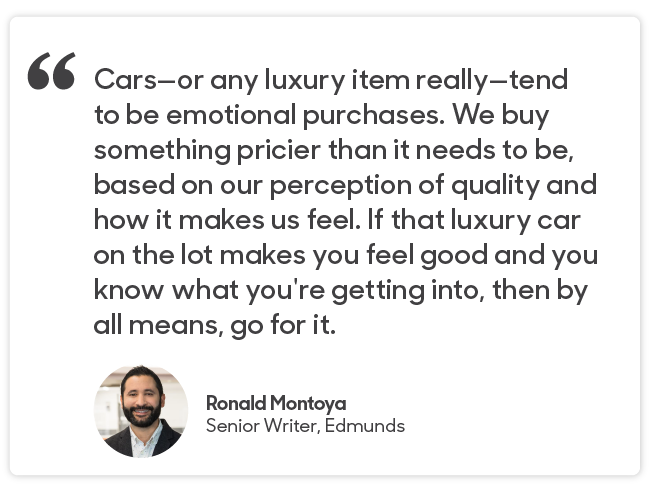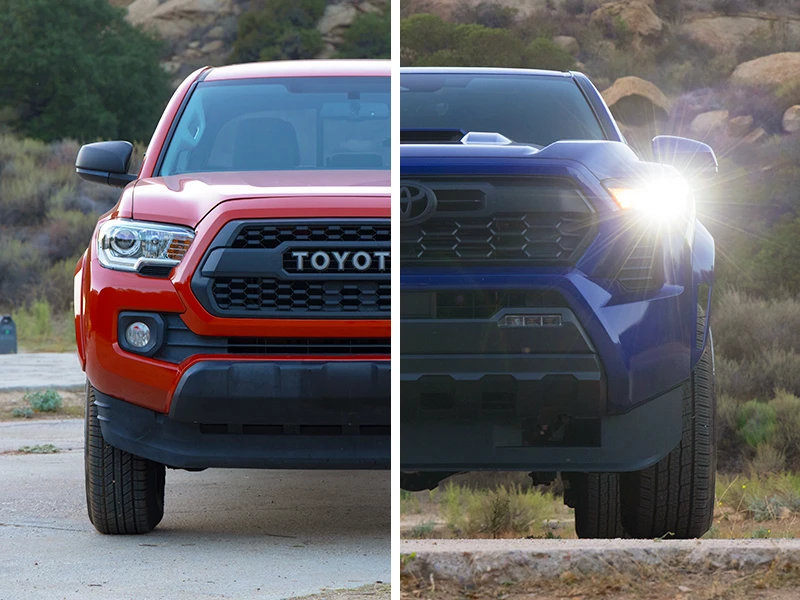
The pros and cons of used luxury versus non-luxury vehicles
With thousands of vehicles in our inventory, we’re here to help make car research easier for you. We’ve partnered with car review experts from Edmunds to weigh in on what matters most when you’re looking to buy a truck or car.
***
Shopping for a car can sometimes make us choose between features we want versus features that would be "nice to have." But what if we told you there is a way to get a luxury car for the same price as a mainstream model?
Consider this scenario: You have a $30,000 budget for your next car. You've been looking into a one-year-old 2024 Toyota Camry, a highly rated midsize sedan. For that price, you're probably looking at the SE trim level, which includes features such as a four-cylinder engine, synthetic leather seats, 18-inch wheels, automatic climate control, and a rearview camera.
But if you're willing to consider a slightly older vehicle, the Lexus ES 350 actually shares much of the same DNA as the Camry (Toyota and Lexus are owned by the same company). This means that even if you choose a Lexus that's five years older than the Camry, you might find a nicer car for the same price. The Lexus offers many of the same modern features, a smoother ride, a more powerful engine, a nicer interior, and, of course, that luxury badge.
Lexus luxury at a Toyota price point? It's a tempting proposition. But is it the smarter choice? Read on, as we examine the pros and cons of buying a lightly used mainstream car versus an older luxury vehicle, be it a sedan, a compact car, or an SUV of any size.
Lightly Used Mainstream Car
Pros
Less wear and tear: A newer mainstream-brand car will only have a few thousand miles on it and need minimal servicing.
Longer warranty: Most non-luxury cars come with at least a three-year limited warranty and a five-year warranty for the powertrain. This means you'll have some coverage for the next couple of years.
Newer technology: The newer car will benefit from the latest technology and features, which can come in handy if you are shopping for a family vehicle, such as an SUV or a minivan. These features can range from better smartphone integration to adaptive cruise control and automatic emergency braking.
Less maintenance: A relatively newer car should need minimal servicing such as oil changes and tire rotations. If something does break down, it should be covered under the remainder of the new-car warranty.
Better depreciation: Depreciation can vary wildly from one vehicle to the next, but in general, the newer non-luxury vehicle should hold its value better over time compared to the older luxury model. The idea is that luxury buyers tend to want the newest thing, so as the luxury vehicle ages, it begins to lose its luster more quickly.
Cons
Not as flashy: The newer car will get you where you need to go, but it won't have the same presence as a luxury vehicle. Which is not necessarily a bad thing, especially if you are looking for a family vehicle, where factors such as convenience and practicality are often more important than luxury.
Paying more for less: In general, the non-luxury vehicle will have fewer features than its luxury counterpart. With the vehicles we're comparing, for example, the Lexus offers backup sensors, a sunroof, full leatherette seats, remote start, and nearly 100 more horsepower from its engine. You can get those features on the Camry, but you'd need to spend more for a higher trim level.
Older Luxury Vehicle
Pros
Nicer styling: We recognize that opinions on styling are subjective, but to our eyes, most luxury vehicles tend to look better than their non-luxury counterparts. On the inside, luxury cars are often filled with nicer materials, such as real wood trim, soft-touch plastics, and aluminum inserts.
Nicer to drive: Luxury vehicles tend to have larger or more powerful engines and more comfortable suspension systems when compared to their mainstream equivalents, which means that they'll likely handle better and glide over imperfections on the road. Similarly, because they tend to be more powerful, luxury vehicles will have quicker acceleration and be a little more entertaining to drive.
Loaner access: If you take your luxury vehicle to the dealership for service and it needs to be in the shop for a while, many brands will offer one of their loaner or "courtesy" vehicles for you to drive in the meantime.
Cons
Little or no warranty: Luxury brands tend to have longer warranties in general, but depending on the age of the car you're interested in, it may be near the end (or out) of its warranty coverage.
More maintenance: The older luxury vehicle will often have more mileage and has had more time for wear and tear to set in. As a result, it is more likely to be closer to major maintenance milestones when costlier items need to be replaced. For example, the Edmunds True Cost to Own (TCO) tool estimates that a 2024 Toyota Camry would cost $3,931 to maintain over five years, while the 2019 Lexus ES 350 would cost $9,216.
Older technology: The ES 350 in our example features a trackpad control interface for the center screen, while the Camry has a simpler touchscreen layout. Apple CarPlay® and Android Auto™ integration are not supported in this Lexus, which means you'd need to rely solely on Bluetooth® audio. However, Lexus does offer a factory retrofit for some of its models, and the 2019 ES can be fitted with Apple CarPlay and Android Auto, as long as the vehicle didn't come with the factory navigation system.

Less fuel-efficient: Since luxury vehicles are often heavier and tend to come with more powerful engines, they are often less fuel-efficient than non-luxury vehicles. For example, the Camry's four-cylinder engine gets an EPA-estimated 32 mpg combined, while the ES 350's V6-powered engine gets an EPA-estimated 26 mpg combined.
If you drive about 13,500 miles a year and assume current fuel prices, this translates to roughly $350 per year in added fuel costs in the Lexus, according to the EPA.Additionally, some luxury vehicles might require premium fuel, while non-luxury vehicles typically do not. This factor could make the difference in fuel costs even more dramatic.

Ronald's take
While it's true that you can often get elegant styling, a more powerful engine, and a nicer interior for about the same price as an older luxury vehicle, this doesn't necessarily translate to a better value because these vehicles are generally more expensive to own. If keeping costs down is your primary goal, then it's probably best to pass on the luxury car.
That said, a decision like this may not always come down to dollars and cents. Cars—or any luxury item really—tend to be emotional purchases. We buy something pricier than it needs to be, based on our perception of quality and how it makes us feel. If that luxury car on the lot makes you feel good and you know what you're getting into, then by all means, go for it.




